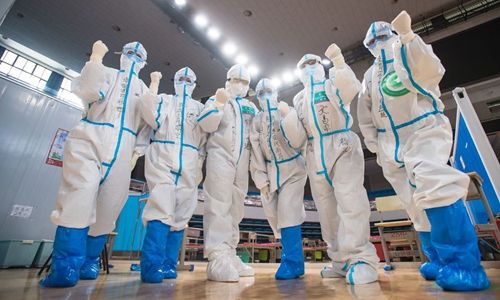Wuhan doctors aid US counterparts despite White House hostility
By Yan Yunming Source:Globaltimes.cn Published: 2020/4/27 3:23:53

Medical workers pose for photos after seeing cured patients off at the Wuchang temporary hospital in Wuhan, Central China's Hubei Province on March 10. Photo: Xinhua
As Wuhan has recovered from the novel coronavirus pandemic thanks to efforts from medical personnel, the virus continues to wreak havoc in many parts of the world, especially in the US which entered the darkest hour with the cases of infections surpassing 1 million.
Although the two countries are separated by thousands of miles and a growing hostility fomented by some US politicians, a group of Wuhan doctors have started offering help to US medics by sharing their first-hand experience.
Ye Baixin, a hematologist with the Renmin Hospital of Wuhan University, helped launch the "Global health professionals on COVID-19," a group of four online chatrooms created specifically for health workers worldwide to share their experience treating COVID-19. The chatrooms have already acquired nearly 2,400 frontline health workers with the majority of members from the US.
"Any recommendations for effective disinfection at clinics?" read an inquiry from the US. A Chinese doctor immediately replied with a picture that showed the equipment used by his clinic.
"Top Israeli scientist says coronavirus pandemic would almost drop to zero in 70 days, using simple stats," said another chatroom member from California in the US who shared a report on COVID-19 scientific updates. Whether infected patients with mild symptoms should be quarantined at home or sent to makeshift hospitals was also discussed.
Ye's phone buzzes daily with such non-stop messages. In addition to providing his practical knowledge, Chinese doctors also try soothing the fears foreign doctors may have as the situation becomes more serious in other countries.
"Having gone through all the hardships and eventually conquered the epidemic, Wuhan doctors are like an internationally recognized brand name to overseas health workers. We cannot only provide them with experience but also boost their confidence," said Ye, adding that "the success of Wuhan and China proves that the virus is not indestructible."
Returning kindness
Ye's original intention was to "repay overseas compatriots for their kindness." The Wuhan doctor was in Kansas, a midwestern state in the US, for a one-year academic visit when the coronavirus broke out in his city.
Although in a foreign country, Ye was worried about his colleagues who were fighting the unknown virus and was eager to contribute. He called on ethnic Chinese in the US to contribute and received numerous responses. On January 28, the first shipment of more than 10,000 N95 face masks arrived in Wuhan.
Ye and a Chinese American doctor helped Chinese tech giant Tencent set up an "epidemic fund" worth 1.5 billion yuan ($212 million) to appraise the quality of medical supplies the company has purchased to support Wuhan. The two doctors slept less than three hours a day just to get the fund up and running.
Ye returned to China in March. With the situation getting worse in the US, many health workers, including his friends, were grappling with a shortage of supplies. Ye decided to take action and began calling for donations.
Within a day, about 100 of Ye's Wuhan colleagues responded and donated money. When the medical supplies arrived in the US, Ye's friends were deeply touched. Many US medics told Ye that "Wuhan doctors are a group of heroes who helped others without hesitation despite their own suffering."
As the Chinese government and civil organizations began to aid foreign countries, Ye said he hoped to do something new.
"It suddenly occurred to me that what the frontline medics overseas needed most was not only protective masks and outfits, but also experience of handling the new disease," Ye told the Global Times.
The first WeChat chatroom was launched on March 22.
The chatroom announcement said, "Thanks to the Chinese all over the world for their assistance and support, Wuhan and China have gone through the darkest times. But humanity's fight against the virus is far from over. We will work with medics from all over the world to overcome the current difficulties."
Posted in: SOCIETY